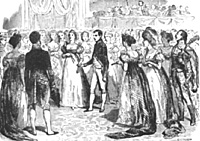 Music for the Nobility & Music for the Masses
Music for the Nobility & Music for the Masses
Concert-goers in European capitals like Vienna and Paris from 1770-1825 heard symphonies, operas, oratorios, concertos, cantatas, sonatas, chamber music, lieder, masses, waltzes, and ballets. Music festivals, concert societies, and public concerts developed for a growing middle class, instead of individual patronage for a select group as in the previous age. This created a diverse and cosmopolitan market for composers to write music with new forms and styles. Bach and Handel, masters of the Baroque music period (1600-1750), laid the groundwork for composers of the Classical music period (1750-1830). Gluck, Haydn, Mozart, and young Beethoven defined an era of music written with the classical ideals of structure and balance.
Haydn developed the symphony, as well as every other genre, and was extremely prolific. Yet he and Mozart were still both servants of the nobility and had to seek favor from them. Haydn for most of his life wore a servant's uniform. Beethoven, however, did not rely on pleasing a private patronage, although he was very well regarded by the elite. His Symphony #3, the "Eroica," was titled "Bonaparte" originally. One of the many common anti-Napoleon legends is that when Napoleon declared himself emperor, Beethoven tore up the title page. Interestingly, he did conduct in Napoleon's presence and later dedicated his "Mass in C," Opus 86 to him. During his middle and late periods, Beethoven continued to write with the structures of classical form from Haydn and Mozart and the Classical music period. However, he enlarged and reshaped them and added new sonorities. His compositions developed into music which would then become more defined by emotional expression instead of formal structure, and led into the Romantic music period (1830-1900).
Beethoven wrote music more for himself and for an ideal universal audience. This transformed the role of composer from that previously of servant to the nobility. Beethoven, more than any other composer of the time, led the changeover into the Romantic music period. It is difficult and arbitrary to define composers as "classical" or "romantic", because many had characteristics of both time periods. But, through Beethoven, a new romanticism led to Schubert, Chopin, Mendelssohn, Rossini, Donizetti, and Liszt, then later to Brahms, Schumann, Mahler, Debussy, and Ravel and into the next century.
A Compendium of Composers Whose Works Premiered for the Concert Audiences of 1770-1821
George Frederick Handel (1685-1759)
Giuseppe Tartini (1692-1770)
Christoph Willibald von Gluck (1714-1787)
Carl Philipp Emanuel Bach (1714-1788)
Nicola Piccini (1728-1800)
Franz Joseph Haydn (1732-1809)
J.C. Bach (1735-1782)
Karl Ditters von Dittersdorf (1739-1799)
Domenico Cimarosa (1749-1801)
Antonio Salieri (1750-1825)
Giovanni Paisiello (1740-1816)
Andre Ernest Modeste Gretry (1741-1813)
Luigi Boccherini (1743-1805)
Domenico Cimarosa (1749-1801)
Wolfgang Amadeus Mozart (1756-1791)
Claude Joseph Rouget de Lisle (1760-1836)
Luigi Cherubini (1760-1842)
Etienne Nicholas Mehul (1763-1817)
Ludwig van Beethoven (1770-1827)
Gaspare Spontini (1774-1851)
Francois-Adrien Boieldieu (1775-1834)
Daniel Auber (1782-1871)
Niccolo Paganini (1782-1840)
Ludwig Spohr (1784-1859)
Carl Maria von Weber (1785-1826)
Gioacchino Antonio Rossini (1792-1868)
Vincenzo Bellini (1802-1835)
Hector Berlioz (1803-1869)
Johann Strauss I (1804-1849
More Napoleon: Introductory Guide
-
Introduction
Prejudice and Pride
Napoleon in Military School
The Young Artillerist's Double Life
Revolution & Opportunity
Women's Fashion During the Revolution
The Siege of Toulon
Napoleon & Josephine
Women's Fashion during the Directory
Fame & Glory: Italy
Fame & Glory: Egypt
Saviour or Usurper
Battle of Marengo
Civil Achievments
Enlightened Despot or Tyrant
Napoleon's Siblings
The Dawn of Gastronomy
Haydn and Beethoven
Women's Fashion during the Empire
Napoleon's Other Women
The Mashalate and Imperial Eagle
History's Greatest General?
Back to Table of Contents -- Napoleon #17
Back to Napoleon List of Issues
Back to MagWeb Master Magazine List
© Copyright 2001 by Napoleon LLC.
This article appears in MagWeb (Magazine Web) on the Internet World Wide Web.
The full text and graphics from other military history magazines and gaming magazines are available at http://www.magweb.com
Order Napoleon magazine direct